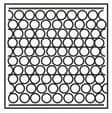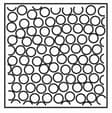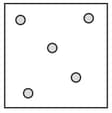David Sang and Darrell Hamilton Solutions for Chapter: The Kinetic Model of Matter, Exercise 3: Exercise 9.2
David Sang Physics Solutions for Exercise - David Sang and Darrell Hamilton Solutions for Chapter: The Kinetic Model of Matter, Exercise 3: Exercise 9.2
Attempt the free practice questions on Chapter 9: The Kinetic Model of Matter, Exercise 3: Exercise 9.2 with hints and solutions to strengthen your understanding. Physics for Cambridge IGCSE workbook solutions are prepared by Experienced Embibe Experts.
Questions from David Sang and Darrell Hamilton Solutions for Chapter: The Kinetic Model of Matter, Exercise 3: Exercise 9.2 with Hints & Solutions
Complete the table. In the first row, draw sketches of the three states of matter in terms of the arrangement of the particles and their movement. Then describe the three states, referring to the three criteria in the first column.
| State | Solid | Liquid | Gas |
 |
 |
 |
|
| How close are particles to their neighbours? | |||
| How do the particles move? | |||
| Strength of forces between particles (strong/weak/zero) |
What is the word we use to describe the process of a solid becoming a liquid?
What is the word we use to describe the process of a liquid becoming a gas?
What is the word we use to describe the process of a gas becoming a liquid?
Why is this model of matter sometimes described as the 'kinetic' model?
Why does an aerosol spray feel cold, even on a hot day?
